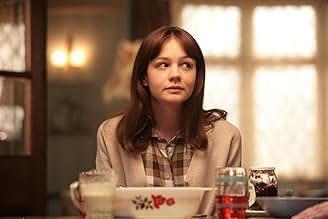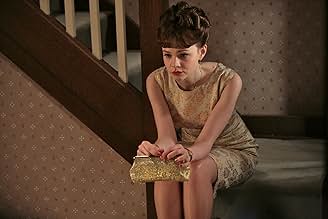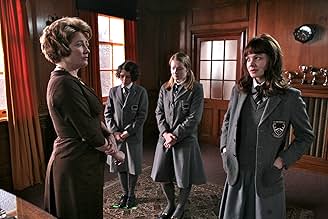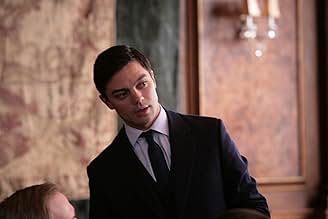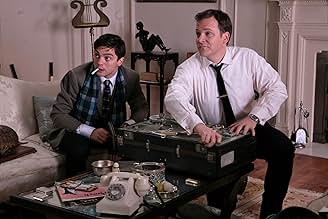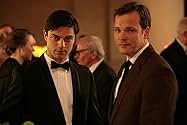CALIFICACIÓN DE IMDb
7.2/10
139 k
TU CALIFICACIÓN
En los años sesenta, en los barrios periféricos de Londres, una historia sobre una adolescente y cómo su vida cambia con la llegada de un playboy que casi duplica su edad.En los años sesenta, en los barrios periféricos de Londres, una historia sobre una adolescente y cómo su vida cambia con la llegada de un playboy que casi duplica su edad.En los años sesenta, en los barrios periféricos de Londres, una historia sobre una adolescente y cómo su vida cambia con la llegada de un playboy que casi duplica su edad.
- Nominado a 3 premios Óscar
- 36 premios ganados y 96 nominaciones en total
Kate Duchêne
- Latin Teacher
- (as Kate Duchene)
- Dirección
- Guionistas
- Todo el elenco y el equipo
- Producción, taquilla y más en IMDbPro
Argumento
¿Sabías que…?
- TriviaThe creative team was initially worried about casting the 22-year-old Carey Mulligan in the role of a 16-year-old but was convinced by her screentest. Rosamund Pike reportedly really wanted the small part of Helen because "no one ever lets me be funny."
- ErroresWhen Jenny finally passes her A levels, she mentions grades. The film is set in 1961 - A level grades were first introduced in 1963. Although,when she's studying at home, it is implied that a significant amount of time passes, it is unlikely to have taken her beyond 1962 when, essentially, you either passed or failed GCE exams.
- Créditos curiososThe opening credits are shown against a background of animated chalk-like drawings, all illustrating various stages and segments of "an education," although not sequentially.
- ConexionesFeatured in The 81st Annual Academy Awards (2009)
- Bandas sonorasSmoke Without Fire
Written by Duffy and Bernard Butler
Performed by Duffy
Courtesy of A&M/Polydor Records (UK), Mercury Records (US)
Opinión destacada
In the cinema certain historical periods have become associated with a particular set of ideas. The 1960s represent change, progress and excitement whereas the 1950s are frequently regarded as a period of stifling social conformity. Of course, the "swinging sixties" did not necessarily start to swing on 1st January 1960, and in retrospect the first few years of the decade seem to have more in common with the conformist fifties than with the "swinging London" era of the later sixties. Certainly, many young people during this period regarded London as a dull, conservative place, and looked eagerly to foreign cities, especially Paris, as being more exciting and radical. There was an enthusiasm for everything French- French philosophy, French literature, French cinema, French fashions, even French jazz and French cigarettes. This Francophilia doubtless included elements of wishful thinking- De Gaulle's Fifth Republic was a more conservative place than many Britons realised- but it was nevertheless an influential phenomenon. It is a phenomenon explored in Julian Barnes' novel "Metroland" (later filmed), and also in this film.
The main character is Jenny, a teenage schoolgirl living in the London suburb of Twickenham in 1961. Jenny is highly intelligent, and is studying hard with a view to taking the entrance exams to Oxford University. She is not, however, really sure why she wants to go to Oxford, except that she is being pushed to do so by her parents who feel that university is the best place for her to meet a wealthy husband.
Jenny's life changes when she meets a handsome and charming older man named David. They quickly become close friends and begin dating. David is clearly wealthy, and claims to be an art dealer and property developer. More important to Jenny, however, is his knowledge of culture. He is well up with all the latest intellectual and artistic fashions from France and takes her to concerts and jazz clubs. What really impresses her is that he takes her to Paris. Eventually, David proposes to Jenny and she accepts and drops out of school without taking her A-levels, her Oxford ambitions abandoned.
Many parents would be worried about the idea of their sixteen-year-old daughter being romanced by a thirty-something man, especially if his influence leads her to neglect her education, but Jenny's parents, especially her complacent, Philistine father, seem strangely unconcerned. His argument is that as Jenny has now found a wealthy suitor there will be no need for her to use Oxford as a dating agency. His one objection to David as a son-in-law seems to be that he is Jewish. (Anti-Semitism was unfortunately widespread in British society at this period). Yet it is obvious to the audience that there is a darker side to David's character. His business methods are, to say the least, not beyond reproach (the character may have been based upon the notorious slum landlord Peter Rachman) and he never takes Jenny to his home, always meeting her in a luxurious flat belonging to his friend and business partner Danny. Eventually, even Jenny herself begins to suspect that David is not all he seems.
The title "An Education" can be understood on two levels. As a coming-of-age drama it narrates Jenny's metaphorical "education" in the wider sense of learning lessons about life. Yet it obviously also deals with her education in the narrower, literal sense of the word. It raises similar issues to another great British film, "Educating Rita", namely whether it is formal academic education or informal education to be gained in the outside world which is the more valuable. Jenny drops out of school because she believes that she can better acquire knowledge, both of high culture and of the ways of the world, through her life with David than through academic study. (Jenny's vision of her future life envisages her living with David in Paris on the Rive Gauche, reading Sartre, smoking Gauloises and going to the cinema to see the latest productions of the Nouvelle Vague). It seems hard to blame her for this conclusion, given that in the film the main advocate of the life academic is her headmistress, an intellectual snob and virulent anti-Semite ("The Jews killed Our Lord!") who serves as a reminder that an educated mind is not necessarily an open one. It is only when she becomes disillusioned with David that Jenny starts to reassess her priorities.
Her performance in the lead role has led to Carey Mulligan being hailed as the "new Audrey Hepburn", although the main point of resemblance seems to be that at one point in the film Jenny sports (as many young women doubtless did in the early sixties) a Hepburn-style hairdo. Nevertheless, on the basis of this performance Mulligan would appear to be a highly promising star in the making, perhaps the new Keira Knightley. Although she is actually 24, she always seems entirely believable as a naive young teenager. Other good contributions come from Peter Sarsgaard as the smooth, reptilian David, Alfred Molina as Jenny's comical, blustering father, Rosamund Pike as Danny's airheaded mistress Helen and Emma Thompson in an excellent cameo as the obnoxious headmistress.
Period drama is something the British cinema often does well, and "An Education" falls within this tradition, even though it has a Danish director, Lone Scherfig. 2009 has already seen two good British costume dramas, "The Young Victoria" and "Dorian Gray", but "An Education" is an even better one. It is not only a study of a girl on the verge of womanhood, but also an exploration of issues such as social class, racism and the value of education. One of the best British films of recent years. I hope that the Academy will remember it when next year's Oscars are being handed out. 9/10
The main character is Jenny, a teenage schoolgirl living in the London suburb of Twickenham in 1961. Jenny is highly intelligent, and is studying hard with a view to taking the entrance exams to Oxford University. She is not, however, really sure why she wants to go to Oxford, except that she is being pushed to do so by her parents who feel that university is the best place for her to meet a wealthy husband.
Jenny's life changes when she meets a handsome and charming older man named David. They quickly become close friends and begin dating. David is clearly wealthy, and claims to be an art dealer and property developer. More important to Jenny, however, is his knowledge of culture. He is well up with all the latest intellectual and artistic fashions from France and takes her to concerts and jazz clubs. What really impresses her is that he takes her to Paris. Eventually, David proposes to Jenny and she accepts and drops out of school without taking her A-levels, her Oxford ambitions abandoned.
Many parents would be worried about the idea of their sixteen-year-old daughter being romanced by a thirty-something man, especially if his influence leads her to neglect her education, but Jenny's parents, especially her complacent, Philistine father, seem strangely unconcerned. His argument is that as Jenny has now found a wealthy suitor there will be no need for her to use Oxford as a dating agency. His one objection to David as a son-in-law seems to be that he is Jewish. (Anti-Semitism was unfortunately widespread in British society at this period). Yet it is obvious to the audience that there is a darker side to David's character. His business methods are, to say the least, not beyond reproach (the character may have been based upon the notorious slum landlord Peter Rachman) and he never takes Jenny to his home, always meeting her in a luxurious flat belonging to his friend and business partner Danny. Eventually, even Jenny herself begins to suspect that David is not all he seems.
The title "An Education" can be understood on two levels. As a coming-of-age drama it narrates Jenny's metaphorical "education" in the wider sense of learning lessons about life. Yet it obviously also deals with her education in the narrower, literal sense of the word. It raises similar issues to another great British film, "Educating Rita", namely whether it is formal academic education or informal education to be gained in the outside world which is the more valuable. Jenny drops out of school because she believes that she can better acquire knowledge, both of high culture and of the ways of the world, through her life with David than through academic study. (Jenny's vision of her future life envisages her living with David in Paris on the Rive Gauche, reading Sartre, smoking Gauloises and going to the cinema to see the latest productions of the Nouvelle Vague). It seems hard to blame her for this conclusion, given that in the film the main advocate of the life academic is her headmistress, an intellectual snob and virulent anti-Semite ("The Jews killed Our Lord!") who serves as a reminder that an educated mind is not necessarily an open one. It is only when she becomes disillusioned with David that Jenny starts to reassess her priorities.
Her performance in the lead role has led to Carey Mulligan being hailed as the "new Audrey Hepburn", although the main point of resemblance seems to be that at one point in the film Jenny sports (as many young women doubtless did in the early sixties) a Hepburn-style hairdo. Nevertheless, on the basis of this performance Mulligan would appear to be a highly promising star in the making, perhaps the new Keira Knightley. Although she is actually 24, she always seems entirely believable as a naive young teenager. Other good contributions come from Peter Sarsgaard as the smooth, reptilian David, Alfred Molina as Jenny's comical, blustering father, Rosamund Pike as Danny's airheaded mistress Helen and Emma Thompson in an excellent cameo as the obnoxious headmistress.
Period drama is something the British cinema often does well, and "An Education" falls within this tradition, even though it has a Danish director, Lone Scherfig. 2009 has already seen two good British costume dramas, "The Young Victoria" and "Dorian Gray", but "An Education" is an even better one. It is not only a study of a girl on the verge of womanhood, but also an exploration of issues such as social class, racism and the value of education. One of the best British films of recent years. I hope that the Academy will remember it when next year's Oscars are being handed out. 9/10
- JamesHitchcock
- 19 nov 2009
- Enlace permanente
Selecciones populares
Inicia sesión para calificar y agrega a la lista de videos para obtener recomendaciones personalizadas
Detalles
- Fecha de lanzamiento
- Países de origen
- Sitio oficial
- Idiomas
- También se conoce como
- An Education
- Locaciones de filmación
- Bloomsbury Service Station - 6 Store Street, Bloomsbury, Londres, Inglaterra, Reino Unido(Jenny finds the letter)
- Productoras
- Ver más créditos de la compañía en IMDbPro
Taquilla
- Presupuesto
- USD 7,500,000 (estimado)
- Total en EE. UU. y Canadá
- USD 12,574,914
- Fin de semana de estreno en EE. UU. y Canadá
- USD 159,017
- 11 oct 2009
- Total a nivel mundial
- USD 26,096,852
- Tiempo de ejecución1 hora 40 minutos
- Color
- Mezcla de sonido
- Relación de aspecto
- 2.35 : 1
Contribuir a esta página
Sugiere una edición o agrega el contenido que falta

Principales brechas de datos
What is the streaming release date of Enseñanza de vida (2009) in Canada?
Responda






